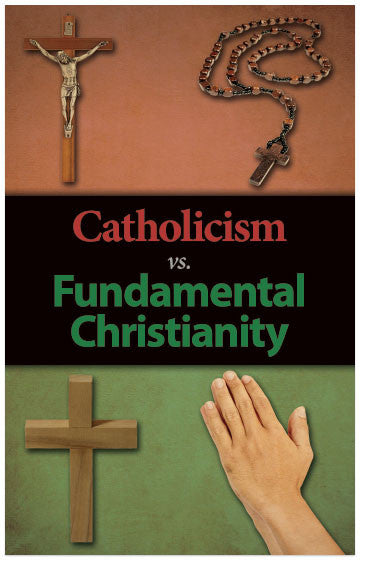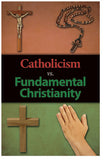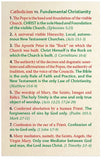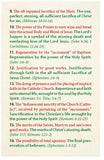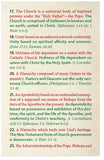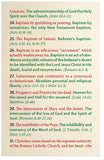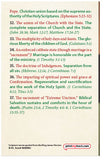Catholicism vs. Fundamental Christianity
Special-Order Folded Tract
 NOTE: This item is custom-printed to order (click for more details).
NOTE: This item is custom-printed to order (click for more details).
This tract is from our print-on-demand library, and is not kept in stock. Select the options below, and we will custom-print a batch just for you. Because this item is custom-printed, you can add your custom imprint to the back page at no extra cost.
- Estimated shipping date: Friday, January 9 (Click for more details)
- SKU:
- Discounts: Discount coupons do not apply to this item
- Format: Folded Tract
- Size: 3.5 inches x 5.5 inches
- Pages: 6
- Imprinting: Available with 5 lines of custom text
- Returns: Because this item is custom-printed to order, it cannot be returned.
Show all item details
The full text of this tract is shown below. (Do you want to print this tract in a different version than the one listed? Contact us and let us know what you're looking for—we may be able to create the alternate version for you at no charge.)
Catholicism vs. Fundamental Christianity
1. The Pope is the head and foundation of the visible Church. CHRIST is the sole Head and Foundation of the visible Church. (Ephesians 5:23)
2. A universal visible Hierarchy. Local, autonomous New Testament Churches. (Acts 13:1-3)
3. The Apostle Peter is the “Rock” on which the Church was built. Christ Himself is the Rock on which the Church is built. (1 Corinthians 10:4)
4. The authority of the decrees and dogmatic assertions and affirmations of the Popes, the authority of tradition, and the voice of the Councils. The Bible is the only Rule of Faith and Practice, and the New Testament is the only Law of Christianity. (Matthew 15:6-9)
5. The worship of Mary, the Saints, Images and Relics. The holy Trinity is the one and only true object of worship. (Acts 12:23; 17:24-29)
6. Conferred absolution by a human Priest. The forgiveness of sins by God only. (Psalm 103:3; Mark 2:7-11)
7. Confession in the ear of a Priest. Confession of sin to God only. (1 John 1:7-9)
8. Many mediators, namely, the Saints, Angels, the Virgin Mary. Only one Mediator between God and man, the Lord Jesus Christ. (1 Timothy 2:5-6)
9. The oft-repeated Sacrifice of the Mass. The one, perfect, atoning, all-sufficient Sacrifice of Christ for sin. (Hebrews 10:10-14)
10. The power of the Priests to turn wine and bread into the actual Body and Blood of Jesus. The Lord’s Supper is a symbol of the atoning death and everlasting love of the Lord Jesus. (John 6:36; 1 Corinthians 11:24-25)
11. Regeneration by the “sacrament” of Baptism. Regeneration by the power of the Holy Spirit. (John 3:6-8)
12. Justification by good works. Justification through faith in the all-sufficient Sacrifice of Jesus Christ. (Ephesians 2:8-9)
13. The doing of penance and the placing of implicit faith in the Catholic Church. Repentance and faith unto eternal life, wrought in the soul by the Holy Spirit. (Romans 5:1; Titus 3:4-7)
14. The “holiness and sanctity of the Church (Catholic)”, received by partaking of the “sacraments.” Sanctification in the Christian’s life wrought by the power of the Holy Spirit. (Romans 6:22-23)
15. The merits of the Saints, Martyrs and one’s own good works. The merits of Christ’s atoning death. (John 17:7; Romans 12:1-2)
16. The possibility of total apostasy. The final preservation of believers. (Ephesians 1:3-12)
17. The Church is a universal body of baptized persons under the “Holy Father”—the Pope. The Church is comprised of believers in heaven and on earth, united in Christ. (Ephesians 1:13-14; 1 Peter 1:3-5)
18. Unity based on an enforced outward conformity. Unity based on spiritual affinity and oneness. (John 17:11; Romans 16:16)
19. Holiness of life dependent on a union with the Catholic Church. Holiness of life dependent on union with Christ by the Holy Spirit. (1 Corinthians 1:2-3)
20. A Hierarchy composed of many Orders in the ministry. Pastors and Deacons are the only necessary Church officers. (Philippians 1:1; 1 Timothy 3:1-8)
21. An Apostolicity based on an unfounded assumption of a supposed succession of Bishops from the days of the Apostles to the present. An Apostolicity based on possession and exhibition of the doctrine, the spirit, and the life of the Apostles, and conformity to Christ’s teaching. (1 Corinthians 4:16-17; Ephesians 5:1; Hebrews 6:12)
22. A Hierarchy which lords over God’s heritage. The New Testament form of church government is democratic. (1 Peter 5:1-3)
23. The Administratorship of the Pope, Bishops and Councils. The administratorship of God the Holy Spirit over the Church. (John 16:1-11)
24. Baptism by sprinkling or pouring. Baptism by immersion, the only New Testament baptism. (Acts 8:38-39)
25. The Baptism of Infants. Believer’s baptism. (Acts 2:41-42; 8:36-37)
26. Baptism is an efficacious “sacrament” which actually washes away sin. Baptism is an act of obedience and public witness of the believer’s desire to be identified with the Lord Jesus Christ in His death, burial and resurrection. (Romans 6:3-4)
27. Submission and conformity to a tyrannical ecclesiasticism. Absolute personal and religious liberty. (Acts 15:5-35; 1 Peter 5:1-3)
28. Purgatory and Prayers for the dead. Heaven for the saved and Hell for the unsaved. (Luke 23:43; Matthew 25:46)
29. The intercession of Mary and the Saints. The intercession of the Son of God and the Spirit of God. (Romans 8:26-27,34)
30. The infallibility of the Pope. The infallibility and inerrancy of the Word of God. (2 Timothy 3:16; 2 Peter 1:19-21)
31. Christian union based on the supreme authority of the Roman Catholic Church, and her head—the Pope. Christian union based on the supreme authority of the Holy Scriptures. (Ephesians 5:23-32)
32. The union of the Church with the State. The complete separation of Church and the State. (John 18:36; Mark 12:17; Matthew 17:24-27)
33. The multiplicity of holy days and feasts. The glorious liberty of the children of God. (Galatians 5:1)
34. An enforced celibate state (though marriage is a “sacrament”)! Marriage is honorable on the part of the ministry. (1 Timothy 3:1-13)
35. The doctrine of Indulgences. Separation from all sin. (Hebrews 12:14; 2 Corinthians 7:1)
36. The imparting of spiritual power and grace at Confirmation. Regeneration and sanctification are the work of the Holy Spirit. (1 Corinthians 6:11; Titus 3:5)
37. The sacrament of “Extreme Unction.” Biblical Salvation sustains and comforts in the hour of death. (Psalm 23:4; 2 Timothy 4:6-8; 1 Corinthians 15:55-57)

